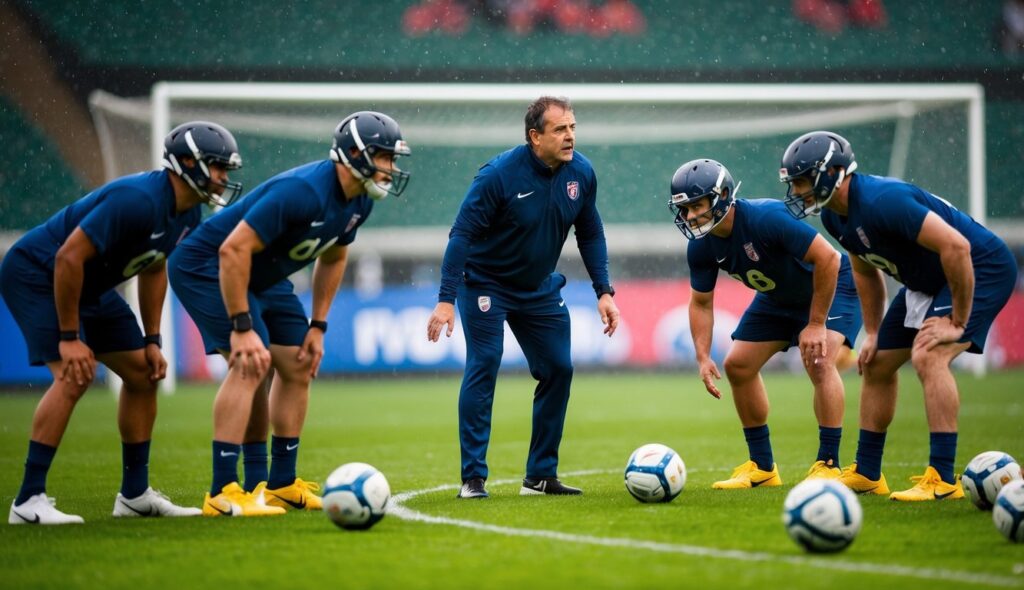50+ Questions to Ask Someone in the Sports Industry: Insights and Key Topics

Entering the sports industry can be both thrilling and demanding. When you meet someone who works in sports, it’s important to ask the right questions to learn from their experiences and insights.
This can open doors to opportunities and a better understanding of various roles in sports.
Whether you’re talking to a coach, an athlete, the questions you ask can reveal a lot about what it takes to succeed in this dynamic field. This post covers 50+ Questions to Ask Someone in the Sports Industry.

For example, you might ask about the daily challenges they face or what skills have been most crucial to their success.
Understanding these aspects helps you grasp the realities of working in sports and what might be expected of you. Also, don’t hesitate to inquire about how they got their start, as their journey can offer valuable lessons and inspiration.
Inquiring about trends and changes in the sports industry can also provide you with a deeper look at what’s shaping the field today.
This kind of information not only keeps you informed but also prepares you to discuss current events and future possibilities. By asking thoughtful questions, you’ll be better equipped to navigate the world of sports.
Understanding the Sports Industry

The sports industry is vast, covering everything from managing teams and organizations to engaging with grassroots sports. It involves roles that deal with sponsorship, management, and the development of sports programs.
Also Check: 100+ Sports Interview Questions: Expert Tips for Engaging Athletes
Careers in Sports Management
Sports management plays a crucial role in how sports teams operate. You might find yourself involved in organizing events, managing players, or developing new partnerships.
Sponsorship is a big part of this, as you’ll look for ways to fund and promote sports initiatives.
In sports, management roles focus on encouraging participation and building community programs. Experience in marketing, finance, and leadership is often needed to thrive in this field.
Also Check: 100+ Sports Interview Questions for Coaches
Understanding these roles helps you make a significant impact in the sports industry, whether you’re working with major leagues or community projects.
Building a Career in Sports

Building a career in sports offers various paths, whether you’re thinking about becoming an athlete, a coach, or a sports journalist. Each path has its own set of challenges and rewards. Understanding the skills and dedication required is key to succeeding in the sports industry.
Pathways to Becoming a Professional Athlete
Becoming a professional athlete requires dedication. You need talent, commitment, and a good support system. Training consistently and refining your skills are critical steps.
Finding a quality coach and participating in competitions can open doors.
Insights into Sports Coaching Careers
A sports coach guides athletes to success. You must understand your sport deeply and be able to teach others. Patience and communication are crucial to inspire and develop players.
Many coaches start by volunteering or working as assistant coaches to gain experience.
Obtaining certifications can be necessary, depending on the level you aim to coach. Developing tactical skills, leadership abilities, and an ability to manage diverse teams can set you apart.
Opportunities for Sports Journalists
Networking is essential: Attending games, interacting with athletes, and building relationships can provide stories. Multimedia skills, such as video editing or podcasting, are also beneficial as the industry shifts towards digital content. Staying updated on sports knowledge keeps your reporting relevant.
50 Questions to Ask Someone in the Sports Industry

- How did you get started in the sports industry?
- What are the biggest challenges you face in your role?
- How do you handle sports injuries among athletes?
- What’s your approach to teamwork in sports?
- How has COVID-19 impacted the sports industry?
- What skills are essential for success in this field?
- How do you manage conflict resolution among team members?
- What’s your favorite part of your job?
- How do you stay motivated during tough seasons?
- What advice would you give to aspiring sports professionals?
- How do you keep up with industry trends?
- What role does technology play in modern sports?
- How do you ensure athlete safety during games?
- How do you set goals for your team or organization?
- What techniques do you use for effective communication?
- How do you maintain player morale?
- What’s the biggest lesson sports has taught you?
- How has the industry evolved in recent years?
- How important is public relations in your role?
- How do you build trust within a team?
- What do you consider when recruiting new talent?
- How do you handle high-pressure situations?
- What is your strategy for game-day preparation?
- How does diversity benefit your team or organization?
- What measures do you take to prevent burnout?
- How do you balance business and sports?
- What is the role of sponsorship in sports today?
- How do you address mental health issues in athletes?
- What’s your strategy for fan engagement?
- How do you handle losing streaks?
- How do you promote inclusivity in sports?
- What role do ethics play in sports management?
- How do you adapt to changing regulations?
- What’s the impact of social media on sports today?
- How do you approach player negotiations?
- What’s your view on sports data analytics?
- How do you plan for your career growth in sports?
- How do you foster a competitive yet supportive environment?
- What’s the biggest innovation you’ve seen in your sport?
- How important is networking in your industry?
- How do you integrate new training methods?
- How do sponsorships and events affect your role?
- How do you measure success in your position?
- How do you support athletes’ long-term development?
- What role do fans play in the sports industry’s growth?
- How do you deal with media pressure?
- How do you encourage youth participation in sports?
- What’s your strategy for handling negative publicity?
- How do you balance tradition with modern advancements in sports?
- How has the role of women changed in sports during your career?
Handling Challenges in Sports Careers: Questions to Ask Someone in the Sports Industry

In the sports world, facing challenges is part of the game. You’ll encounter setbacks such as injuries, team conflicts, and sudden changes like global events. Learning how to handle these hurdles is key to succeeding in your career.
Adapting to Changes and Crises
Unexpected changes, like the COVID-19 pandemic, disrupt the routine of sports careers. Adapting effectively requires flexibility and problem-solving skills. You might need to adjust training schedules or compete under different conditions.
During such times, communication plays a pivotal role. Staying connected with your team and coaches helps in aligning new goals and strategies. It is also important to embrace technology for virtual training sessions or meetings, keeping skills sharp and maintaining focus.
Change can also bring opportunities for growth. Embracing new roles or exploring different aspects of your sport can lead to further development and potential career advancement.
Maintaining Team Harmony During Conflicts
Teamwork is essential for any sports career. Conflicts can arise due to competition, stress, or miscommunication. Addressing them promptly is vital to maintain team harmony. Open dialogue helps resolve misunderstandings and strengthens relationships.
Active listening and empathy promote a supportive environment. Encouraging team members to express concerns without fear of judgment fosters trust. Sometimes, involving a neutral mediator or coach can assist in finding fair solutions.
Creating clear team goals and roles reduces tension. Consistent team-building activities can reinforce bonds, ensuring everyone is aligned and working towards common successes.
Frequently Asked Questions: Ask Someone in the Sports Industry

What inspired you to pursue a career in the sports industry?
Many in the sports industry are driven by a deep passion for athletics. It often starts with personal experiences in sports as a child or admiration for sports heroes. This passion fuels their desire to contribute to the field in meaningful ways.
How do you deal with the pressure of competition and high-stress moments?
Managing stress is crucial in sports. Professionals often use techniques like visualization and deep breathing to stay calm. Support from coaches and teammates also plays a vital role in handling pressure during intense competitions.

Can you share how data analytics has influenced your approach to sports strategy?
Data analytics has transformed sports strategy by providing insights into performance trends and opponent strategies. It helps in making informed decisions, improving training methods, and predicting outcomes, leading to more efficient and effective play strategies.
What qualities do you think are essential for someone to succeed in the sports field?
Key qualities for success include determination, flexibility, and teamwork. Being able to adapt to changing circumstances and work collaboratively with others is important. A strong work ethic and resilience are also essential to overcome setbacks.
What has been the most challenging aspect of your career in sports, and how have you overcome it?
Challenges in sports careers often include dealing with injuries or career setbacks. Overcoming these requires patience, perseverance, and sometimes a change in training or mindset. Professionals often cite support systems as crucial to their recovery and progress.

How do you maintain a healthy work-life balance given the demanding nature of sports schedules?
Balancing work with personal life in sports can be tricky. Professionals prioritize time management and set boundaries to ensure rest and recovery. They also focus on time with family and engage in hobbies to maintain their well-being.
All the Best !






